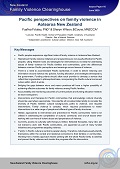
Issues Paper 16, June 2020
Authors: Fuafiva Fa'alau, PhD1 and Sharyn Wilson, BCouns, MNZCCA2
1 Lecturer, Pacific Health, School of Population Health, University of Auckland; Director, Sea of Islands Services
2 Independent practitioner; Cultural advisor; Director, Soul Talk Auckland
Downloads
Key Messages
- Pacific peoples experience significant rates of family violence in Aotearoa New Zealand.
- ‘Mainstream’ family violence initiatives and programmes are not usually effective for Pacific peoples. Using Western tools and ideologies for interventions is not ideal for addressing issues of family violence for Pacific families and communities, given the differences between common Pacific perceptions and meanings around issues of violence.
- There is a need to accommodate Pacific worldviews in order to deliver meaning and information around violence into policies, funding allocation, and strategies developed by the government. Funding criteria should allow each provider to develop a service that reflect their organisation’s philosophical base, incorporating the Pacific cultural norms and culture within which it works.
- Bridging the gaps between micro and macro practices will have a higher possibility of achieving effective outcomes for family violence among Pacific families.
- Accountability and monitoring outcomes of current policies and funding allocation needs to be more transparent.
- Interventions and therapies for Pacific communities that acknowledge cultural diversity should be used where appropriate. ‘One size fits all’ provides limited ability to consider the diversity of Pacific families' cultural backgrounds, paths to violence, and required interventions. Family violence is complex, which requires practitioners to match interventions to a wide range of people and different types of family structures.
- Holistic approaches to intervention and prevention for Pacific communities need to be utilised in addressing the complexities of cultural, communal, and church issues when working with survivors of violent abuse and perpetrators of violence.
- Currently, access to culturally safe therapy is limited. Selected therapists, many who are not trained to work with Pacific communities, are appointed as part of many funded initiatives and programmes targeting violence.
- ‘Family’ in Pacific culture is central to people’s being. Therefore, individuals usually identify themselves within the context and relational connection to their families or communities. Working from a holistic approach means working with the whole Pacific family to address and prevent family violence and monitor the progress after the intervention.
Recommended citation
Fa'alau, F., & Wilson, S. (2020). Pacific perspectives on family violence in Aotearoa New Zealand. Issues Paper 16. Auckland, New Zealand: New Zealand Family Violence Clearinghouse, University of Auckland.
ISSN: 2253-3222, published online only.
Feedback
The Clearinghouse welcomes your feedback - please email us.


